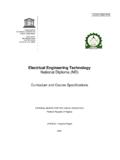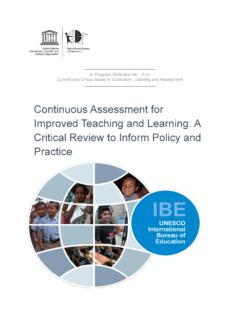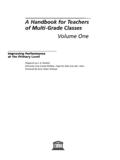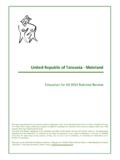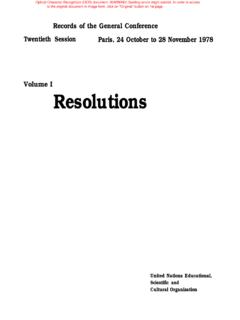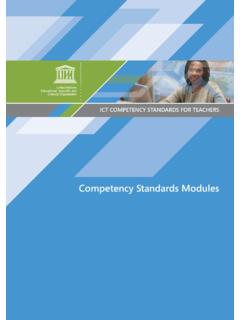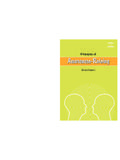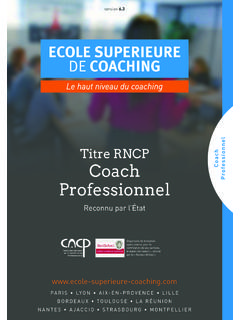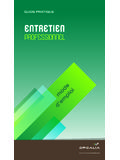Transcription of Teacher professional development: an …
1 Teacher professional development : an international review of the literature Eleonora Villegas-Reimers UNESCO: international Institute for Educational Planning international Institute for Educational Planning The views and opinions expressed in this booklet are those of the author and do not necessarily represent the views of UNESCO or of the IIEP. The designations em- ployed and the presentation of material throughout this review do not imply the expression of any opinion whatsoever on the part of UNESCO or IIEP concerning the legal status of any country, territory, city or area or its authorities, or concerning its frontiers or boundaries.
2 The publication costs of this study have been covered through a grant-in-aid offered by UNESCO and by voluntary contributions made by several Member States of UNESCO, the list of which will be found at the end of the volume. Published by: international Institute for Educational Planning 7-9 rue Eug ne Delacroix, 75116 Paris e-mail: IIEP web site: Cover design: Maro Haas Typesetting: Lin ale Production Printed in IIEP's printshop ISBN: 92-803-1228-6. UNESCO 2003. international Institute for Educational Planning Table of contents Introduction 7. Chapter I. What is Teacher professional development ? 11. Background information 11.
3 Systems and/or models of professional development ? 16. Variables that contribute to the success of teachers' professional development 17. Chapter II. Why is teachers' professional development important? 19. Does professional development have an impact on teachers? Does it have an impact on student learning? 19. Does professional development have an impact on the success of educational reform? 24. Chapter III. The teaching profession 31. Teachers as artists 32. If not artists, workers or professionals? 33. What kind of professionals? Clinicians, researchers, educators? 36. What do teachers need to know? 39. How do teachers learn to be teachers?
4 Teacher initial education and training as the first step in Teacher professional development 42. Pre-service education 43. In-service education 55. Chapter IV. Beyond traditional pre-service and in-service training: models and cases of teachers' professional development 67. What should teachers' professional - development programmes promote? 67. 5. international Institute for Educational Planning Teacher professional development : an international review of the literature Models and types of Teacher professional development 69. First group: Organizational partnership models 71. Second group: Individual or small group models 89.
5 Conclusions 118. Chapter V. Factors to consider when planning, implementing and assessing the professional development of teachers 119. A culture of support: The role of school and education leaders 119. The role of context: Multiple settings/multiple professional communities 121. Stages of development of a school system 123. Time 125. Financial resources 126. Stages in professional development 129. Steps of professional development 132. The use of technology for teaching purposes 133. The role of Unions in teachers' professional development 136. The role of Teacher -educators 137. Chapter VI. Policy implications and recommendations 141.
6 References 145. 6. international Institute for Educational Planning Introduction These are changing times in education systems around the world. With the start of the new millennium, many societies are engaging in serious and promising educational reforms. One of the key elements in most of these reforms is the professional development of teachers; societies are finally acknowledging that teachers are not only one of the variables' that need to be changed in order to improve their education systems, but they are also the most significant change agents in these reforms. This double role of teachers in educational reforms being both subjects and objects of change makes the field of Teacher professional development a growing and challenging area, and one that has received major attention during the past few years.
7 This new emphasis has been welcomed by teachers and educators in general as it represents a much needed appreciation of teachers' work, and also promotes the concept of teaching as a profession. Unfortunately, others have taken this new emphasis to be a sign that teachers are not providing adequate teaching standards. Guskey and Huberman (1995) reflect on this paradox and also report that their work with teachers worldwide offers little evidence to support this belief. The vast majority of teachers and school administrators we have encountered are dedicated professionals who work hard under demanding conditions (Guskey and Huberman, 1995, p.)
8 1). It is for these hard-working teachers and educators that professional development opportunities are needed, not only because they promote the recognition of their work as professionals, but also because as is the case for all professionals in any field new opportunities for growth, exploration, learning, and development are always welcome. 7. international Institute for Educational Planning Teacher professional development : an international review of the literature In order to contribute to the knowledge base of educators, policy-makers, Teacher -educators, and administrators who are engaged in the process of Teacher education and development and who are committed to planning, implementing and assessing sensible educational reforms, this book presents a review of the recent international literature published on models, factors and case studies of Teacher professional development .
9 This book supports the idea that good teaching methods have a significant positive impact on how and what students learn. Learning how to teach, and working to become an excellent Teacher , is a long-term process that requires not only the development of very practical and complex skills under the guidance and supervision of experts, but also the acquisition of specific knowledge and the promotion of certain ethical values and attitudes. In the words of Calderhead and Shorrock (1997), in addition to knowing what' and knowing how', teachers must also be competent in knowing why' and knowing when'. This book also supports the idea that the professional development of teachers is a lifelong process which begins with the initial preparation that teachers receive (whether at an institute of Teacher education or actually on the job) and continues until retirement.
10 Therefore, the book reviews models of teachers' initial preparation, as well as models of in-service training' and other learning experiences that enhance teachers' practices and professionalism throughout their lives. Because Teacher professional development is changing so rapidly and so frequently all around the world, we are aware that even the most recent'. literature may already present models or experiences that are no longer being implemented in a particular country. Therefore, the purpose of presenting specific examples of models in particular countries is to illustrate options that have been developed to promote teachers' professional development , rather than to describe how the process is being realized at this particular time in a specific country in the world.
